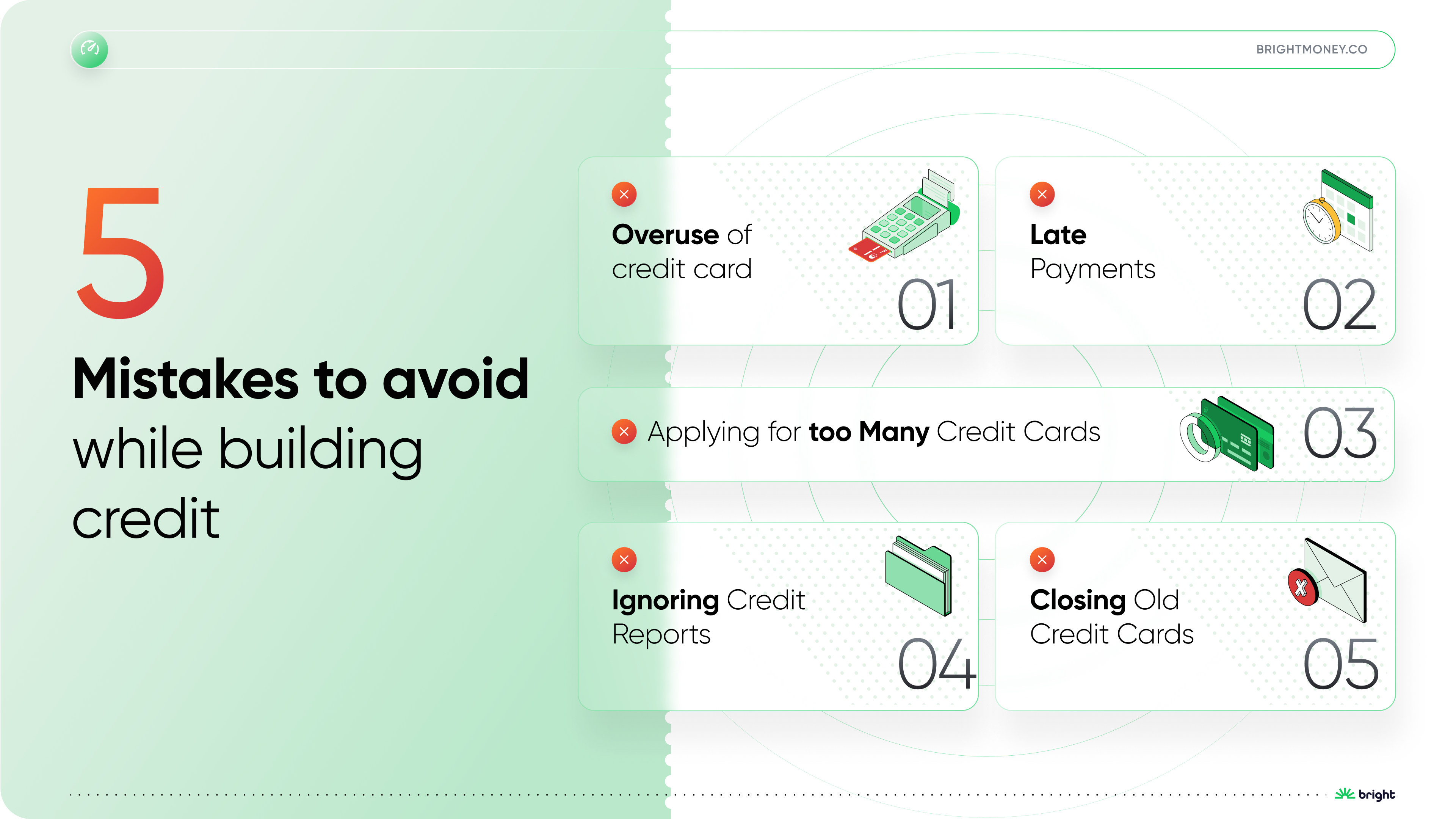You are now leaving the Bright website and entering a third-party website. Bright has no control over the content, products, or services offered, nor the security or privacy of information transmitted to others via their website. We recommend that you review the privacy policy of the site you are entering. Bright does not guarantee or endorse the products, information, or recommendations provided on any third-party website.
When you are working on improving your credit score, some mistakes can cost you significantly and lead to a bad credit score.
Building a strong credit foundation is like laying the groundwork for a bright financial future. As you embark on the journey to establish or improve your credit, it's essential to navigate this terrain with caution and avoid potential pitfalls that could hinder your progress. In this informative guide, we'll uncover the common mistakes that can adversely impact your credit-building efforts.
Common Mistakes to Avoid When Building Credit
Rebuilding credit is a journey, and like any journey, it's important to avoid pitfalls along the way. While credit cards can be a powerful tool for rebuilding credit, they must be used responsibly.
Here are some common mistakes to avoid during your credit-building journey.
1. Overuse of Credit
While it might be tempting to use your credit card for every purchase, it's important to avoid overusing your credit card accounts. Maxing out your cards can lead to a high credit utilization ratio, which could negatively impact your credit score. Aim to use only a small portion of your available credit.
This shows lenders that you can handle credit responsibly and live within your means. Credit cards are not free money but a tool to build a positive credit history.
2. Late Payments
Paying your bills late is a common mistake that can significantly harm your FICO score. Even a single late payment can stay on your credit report for up to seven years, acting as a red flag to potential lenders.
To avoid this, consider setting up automatic payments or reminders to ensure you pay your bills on time. Consistently making on-time payments can significantly improve your credit score over time.

3. Ignoring Credit Reports
It's easy to ignore your credit report', but doing so can be detrimental to your credit rebuilding process. Regularly checking your report allows you to spot any errors and monitor your progress. If you find any inaccuracies, dispute them immediately.
Errors can drag down your credit score and hinder your credit rebuilding efforts. Plus, understanding your report can help you make informed decisions about how to improve your credit.
4. Applying for Too Many Loans
While it might seem like a good idea to apply for multiple Loans to increase your available credit, this can actually hurt your credit score.
This is called a hard pull. Each time you apply for a Loan, a hard inquiry is made on your credit report, which can lower your score. It's better to focus on responsibly using one or two credit instruments to rebuild your credit. You can better understand how to use your credit card to build credit here.
5. Closing Old Credit Cards
You might think that closing old or unused credit cards could help your credit score, but it can actually have the opposite effect.
Closing a credit card can decrease your available credit and increase your credit utilization ratio, both of which can harm your credit score. Instead of closing old cards, consider using them for small, manageable purchases that you pay off in full each month.
3 Ways to Recover From Credit Mistakes
Everyone makes mistakes, and when it comes to credit, a misstep doesn't have to spell disaster. Whether you've missed a payment, maxed out your card, or hit a financial rough patch, there are ways to recover and get your credit-building journey back on track.
1. Damage Control: The first step in recovering from a credit mistake is to stop the bleeding. If you've missed a payment, make it as soon as possible. Most credit card companies don't report late payments to the credit bureaus until they're 30 days overdue, so paying before this can prevent a mark on your credit report.
2. Create a Plan: Next, create a plan to prevent future mistakes. This might involve setting up automatic payments, creating a budget to ensure you don't overspend, or seeking advice from a credit counselor. The goal is not just to recover from this mistake but to prevent future ones.
3. Rebuild Your Credit: Once you've addressed the immediate issue and set up preventative measures, it's time to focus on rebuilding your credit. This might involve using a secured credit card, becoming an authorized user on someone else's card, or taking out a credit-builder loan. Check out Bright Builder to make this process easier. Consistent, responsible credit use over time can help repair your credit score.
Mastering the art of credit building requires not only knowing what steps to take but also being aware of the potential stumbling blocks along the way. By learning from the mistakes discussed in this guide, you can proactively safeguard your credit journey and maintain a steady course toward a stronger credit profile.
Maintaining your credit score is a process that requires focus and attention. The Bright Money App can ease your burden by proving an auto-managed financial plan for you. Download your credit partner today!



